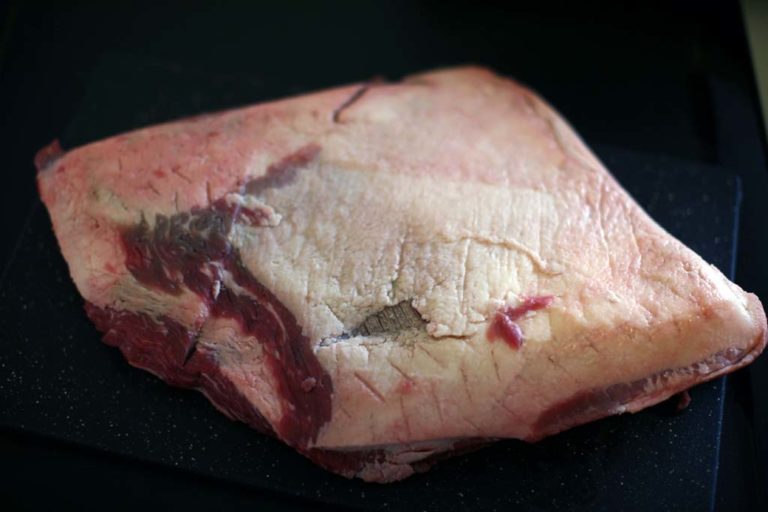
Chef's notes:
This article is all about making corned beef from scratch. Starting with raw ingredients, it takes 7-10 days from start to finish so plan accordingly.
I never thought of making my own corned beef until I started building this site. And the only reason I considered doing it was because I realized that I could. Also, I thought it would be fun to try something that is not commonly done at home.
The mixture of spices are what gives it its signature flavor, and a simple food preservative gives it its pink color. It fixes, or preserves, the color of the raw meat, which is why it is still pink when it is cooked. Much like smoke does to smoked meats. Finding a consistent recipe for corned beef brine was difficult. But fortunately I was able to find a recipe that is used by a well-known maker of corned beef. Of course I changed it a little because I believe in making things your own. So the following is my corned beef brisket recipe.
Ingredients
- 4-5 lbs beef brisket point or flat
- 4 cloves garlic
- 4 bay leaves
- 2 tsp black peppercorns
- 1 tsp white peppercorns
- 2 tsp allspice berries
- 2 tsp mustard seed
- 2 tsp corriander seed
- 1 tsp whole cloves
- 1 cinnamon stick
- 1 tsp cardamom pods
- 1 tsp ginger
- 1/2 tsp nutmeg
- 1-2 tsp red pepper flakes
- .56# sea salt
- .29# brown sugar
- 8 cups hot water
- 2# ice
- 3 tsp pink curing salt or 1 T saltpeter
Corning Beef Brisket in Pickling Spice, Sea Salt, Garlic and Pink Curing Salt
- Trim the beef brisket into manageable pieces. If you get a whole beef or packer cut brisket, you will want to trim it into two pieces. A whole brisket is between 8-13 pounds and requires a lot of trimming. The traditional trimming usually leaves you with a flat piece and a pointy piece, conveniently referred to as points and flats. The trimming of a beef brisket deserves its own article because it is tricky. So, for this article, I recommend you buy a pre-trimmed brisket flat or point and skip the hassle.
- Mix up the brine. Heat up the water and add the curing salt, sugar and sea salt, and stir to dissolve. Add the spices and herbs to the pot and turn off the heat. Stir the pot and make sure everything is well mixed and dissolved. Add the ice to the birine and stir until its melted and the brine is cool. If the brisket is a big chunk like the one I have here you may want to inject some of the brine into the center-mass of the meat to give it a head-start. Otherwise you may end up with a brown spot in the middle.
- Pour the brine over the meat. Put a large zipper-style bag into a large bowl or large pot and place the brisket inside. Carefully pour the brine over the meat, making sure to get everything in the bag. Zip the bag until it’s almost shut, and using your hands, work out any air bubbles stuck near the meat. Once you have most of the air out, zip the bag shut and put it back in the bowl or pot. Check the bag for leaks and double-bag if you are concerned.
- Put the brisket into the fridge. Put the container with the brisket in it on the bottom shelf of your refrigerator. The brining process will take from 7-10 days to complete. if your brisket is less than 4 pounds it should take 7 days. If its bigger than that it will take 10 days to get completely brined. Every other day move the meat around in the bag, flipping it over and what not. This will make sure you don’t end up with any brown spots. Other than that all you can do is wait.
Tips & Tricks
- I had a hell of a time finding saltpeter. I stopped at every grocery store, pharmacy, hardware store, and butcher in my part of town. None of them had it. And they all looked at my funny, like I was a terrorist or something. Out of desperation, I went to a Chinese market up the way where I found a little baggy for 80 cents labeled nitre granules. It sounded right to me, and it was cheap, so I brought it home and looked up nitre on Google. Turns out nitre is another name for saltpeter. So, if you are having trouble finding it, try that. Also, saltpeter preserves the meat and gives it its color, but if you plan on cooking it right away and don’t care about the color, you don’t need it. The salt is enough to keep it from spoiling in the brine. *update. Now I use pink curing salt (Prague Powder #1) instead of saltpeter. It’s more reliable.
- Another popular way to mix up the brine is to rub all ingredients on the meat except for the saltpeter and water. Then dissolve the saltpeter in water and pour it over the meat. Not exactly sure if it matters which way you do it. But in case you wanted to try doing it another way, I thought I would tell you about this.
